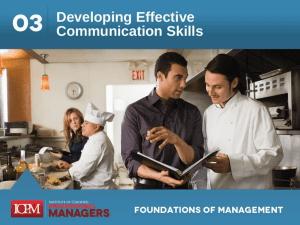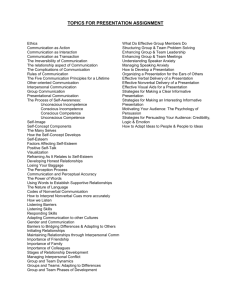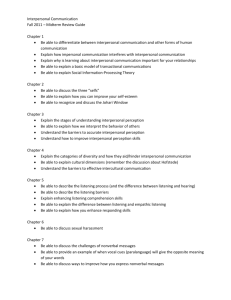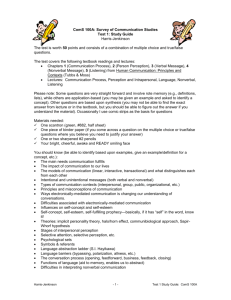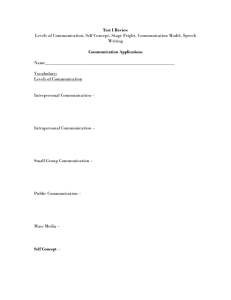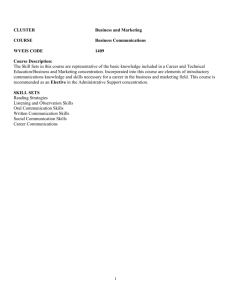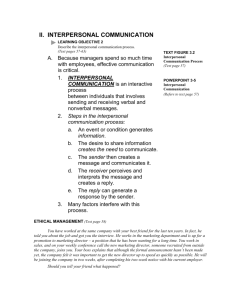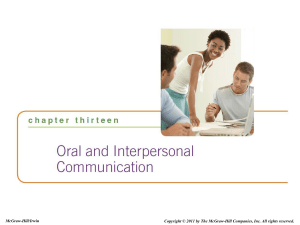Essentials of Communication Lesson Objectives
advertisement
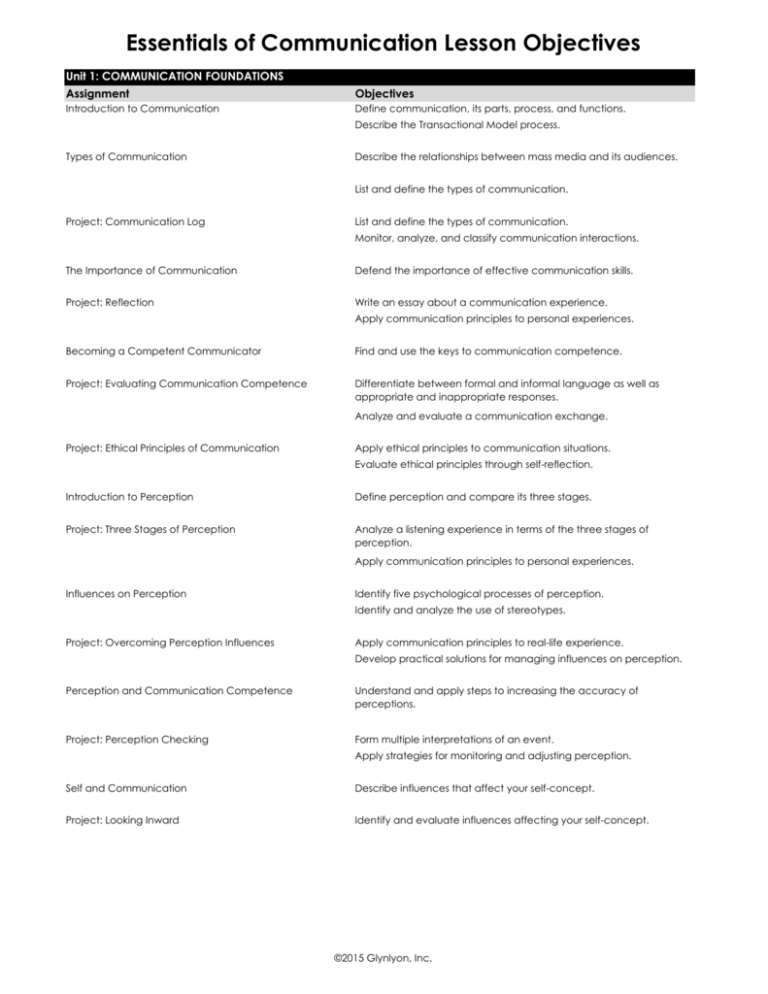
Essentials of Communication Lesson Objectives Unit 1: COMMUNICATION FOUNDATIONS Assignment Objectives Introduction to Communication Define communication, its parts, process, and functions. Describe the Transactional Model process. Types of Communication Describe the relationships between mass media and its audiences. List and define the types of communication. Project: Communication Log List and define the types of communication. Monitor, analyze, and classify communication interactions. The Importance of Communication Project: Reflection Defend the importance of effective communication skills. Write an essay about a communication experience. Apply communication principles to personal experiences. Becoming a Competent Communicator Find and use the keys to communication competence. Project: Evaluating Communication Competence Differentiate between formal and informal language as well as appropriate and inappropriate responses. Analyze and evaluate a communication exchange. Project: Ethical Principles of Communication Apply ethical principles to communication situations. Evaluate ethical principles through self-reflection. Introduction to Perception Define perception and compare its three stages. Project: Three Stages of Perception Analyze a listening experience in terms of the three stages of perception. Apply communication principles to personal experiences. Influences on Perception Identify five psychological processes of perception. Identify and analyze the use of stereotypes. Project: Overcoming Perception Influences Apply communication principles to real-life experience. Develop practical solutions for managing influences on perception. Perception and Communication Competence Project: Perception Checking Understand and apply steps to increasing the accuracy of perceptions. Form multiple interpretations of an event. Apply strategies for monitoring and adjusting perception. Self and Communication Describe influences that affect your self-concept. Project: Looking Inward Identify and evaluate influences affecting your self-concept. ©2015 Glynlyon, Inc. Essentials of Communication Lesson Objectives Unit 1: COMMUNICATION FOUNDATIONS (CONT.) Assignment Objectives Self-Concept and Competent Communication Label the quadrants of the Johari Window model and describe how, when one quadrant is larger than the others, it affects communication. Compile appropriate communication strategies. Project: Changing Your Self-Concept Set goals for improving your self-concept. Apply communication principles to real-life situations. Analyze and evaluate your self-concept in light of your own and others' perceptions. Self-Disclosure Discuss appropriate uses of self-disclosure. Review Review and reinforce Unit 1 communication concepts in preparation for a unit test. ©2015 Glynlyon, Inc. Essentials of Communication Lesson Objectives Unit 2: LANGUAGE CHARACTERISTICS Assignment Objectives The Nature of Language Identify specific systems of language Understand ambiguities of language in communication Analyze different conventions of language Language in Social Settings Identify characteristics of oral language and analyze standards for using informal, formal, and technical language appropriately. Demonstrate appropriate uses of informal, formal, and technical language. Project: Recognizing In-Language Identify examples of in-language. The Functions of Language Define how language influences our thoughts, attitudes, and perceptions. Project: Using Responsible Language Distinguish between I-language and You-language. Nonverbal Communication Identify and analyze effective use of nonverbal skills and strategies. Project: Recognizing Nonverbal Behavior Analyze and categorize types of nonverbal communication. The Functions of Nonverbal Communication Identify and analyze effective use of nonverbal skills and strategies. Types of Nonverbal Communication Identify and analyze effective use of nonverbal skills and strategies. Project: Ethics and Impressions Analyze the impact of nonverbal communication on personal impressions. Competent Nonverbal Communication Identify and analyze effective use of nonverbal skills and strategies. Project: Observing Nonverbal Communication Identify and analyze effective use of nonverbal skills and strategies. The Listening Process Identify and demonstrate use of the listening process components. Listening Styles Identify and demonstrate types of listening and when they are appropriate. Project: Using Listening Styles Apply a variety of listening techniques to a speaking situation. Listening Barriers Identify and demonstrate specific kinds of listening such as critical, informational (deliberative) and, empathic types. Project: Listening Strategies Apply listening strategies in a variety of contexts. Review Review and reinforce Unit 2 communication concepts in preparation for a unit test. ©2015 Glynlyon, Inc. Essentials of Communication Lesson Objectives Unit 3: INTERPERSONAL RELATIONSHIPS Assignment Objectives Types of Interpersonal Relationships Identify and analyze types of interpersonal relationships and their purposes. Relationship Stages Identify and analyze stages in an interpersonal relationship, based on Knapp's Relational Model. Project: Applying Knapp's Relational Model Assess real-life interpersonal relationships in light of Knapp's Relational Model. Fluctuations in Relationship Development Examine relationship conflicts and propose strategies to achieve conflict resolution. Apply problem-solving strategies to interpersonal communication issues. Conversation Evaluate and summarize your own and others' communication effectiveness based on the five-step model to communication. Project: Are You a Good Conversationalist? Analyze and compare conversations based on the five-step model of communication. Conversation Management Select appropriate communication management skills (etiquette, protocol) in interpersonal communication. Evaluate and summarize your own and others' communication effectiveness. Project: Practicing Cues Apply conversational principles to a real-life situation. The Basics of Conversational Competence Evaluate and summarize your own and others' communication effectiveness. Select appropriate communication and management skills (etiquette, protocol) in interpersonal communication. Participate appropriately in interpersonal communication situations in regard to different cultural and social backgrounds and settings. Etiquette for Introductions Select appropriate communication management skills (etiquette, protocol) in interpersonal communication. Project: Introductions Apply communication principles of introduction etiquette to a variety of real-life situations. Telephone Etiquette Select appropriate communication management skills (etiquette, protocol) in interpersonal communication. E-mail Etiquette Select appropriate communication management skills (etiquette, protocol) in interpersonal communication. ©2015 Glynlyon, Inc. Essentials of Communication Lesson Objectives Unit 3: INTERPERSONAL RELATIONSHIPS (CONT.) Assignment Objectives Criticism Participate appropriately in interpersonal communication situations that involve different cultural and social backgrounds and settings. Identify and analyze ethical and social responsibilities of communicators. Project: Expressing Yourself Politely Apply communication skills to giving and receiving criticism. Interviewing Analyze and apply the use of appropriate communication skills within interview settings. Preparing for an Interview Select appropriate means of gathering and using accurate and complete information as a basis for making communication decisions. Identify unlawful questions in an interview and how to respond. Analyze and apply the use of appropriate communication skills within interview settings. Project: Preparing for a Job Interview Apply interview skills to complete a job interview questionnaire. Review Review and reinforce Unit 3 communication concepts in preparation for a unit test. ©2015 Glynlyon, Inc. Essentials of Communication Lesson Objectives Unit 4: UNDERSTANDING GROUPS Assignment Objectives The Small Group Identify and analyze types of group relationships and their purposes. Small Group Types and Formats Identify and analyze types of group relationships and their purposes. Project: Brainstorming Analyze small group behavior to increase effectiveness. Work with a small task group to brainstorm ideas. Organizations Identify and analyze appropriate channels of organizational communication. Identify and analyze types of group relationships and their purposes. Factors Affecting Group Dynamics Identify group dynamics and processes for effective participation in groups. Individual Competence in Groups Identify group dynamics and processes for effective participation in groups. Demonstrate appropriate communication skills (verbal, nonverbal, listening) to encourage group effectiveness. Problem Solving in Groups Identify and demonstrate appropriate communication skills (verbal, nonverbal, listening) to encourage group effectiveness. Analyze a problem given to a group and develop an effective means of solving the problem. Leadership Styles Identify leadership skills in a group culture. Analyze effective communication skills in a group leadership. Project: Identifying Leadership Styles Analyze leadership characteristics and classify according to leadership style. Leadership Functions Analyze the participation of group members and evaluate group effectiveness. Identify effective communication skills in group leadership. Identify leadership skills in group culture. Project: Evaluating Group Effectiveness Analyze the participation of group members and evaluate group effectiveness. Review Review and reinforce Unit 4 communication concepts in preparation for a unit test. ©2015 Glynlyon, Inc. Essentials of Communication Lesson Objectives Unit 5: PRESENTING AND INTERPRETING PUBLIC MESSAGES Assignment Objectives Determining the Purpose and Choosing a Topic Define the audience, topic, and purpose(s) of a speech. Project: Defining Topic and Purpose Select a topic for a ten-minute speech. Determine the purpose for a speech: to inform, persuade, or entertain. Project: Developing a Thesis Statement Write a thesis statement for a speech. Identify characteristics of thesis statements. Defining Your Audience Define the audience, topic, and purpose(s) for a speech. Project: Defining Your Audience Define audience type, demographics, and occasion for a speech. Project: Developing a Preliminary Outline Devise and organize speech thesis statements and outlines. Research Use research techniques in developing a topic. Project: Conducting Research Research a topic in preparation for a speech. Supporting Materials Use reliable information to support the content of a speech. Presenting the Topic Visually Use visual and/or auditory aids to support and present a speech. Project: Revising and Expanding the Outline Revise a preliminary outline to incorporate research. Selecting an Organizational Pattern Identify and use appropriate organizational patterns to prepare a speech. Outlining a Speech Devise a presentation outline. Project: Developing Your Outline Develop a skeleton outline for a speech. Preparing Your Notes and Cues Use scripts or notes to present a speech. Project: Developing Speaking Notes Develop a keyword outline and note cards for a speech. Preparing to Deliver a Speech Know the types and strategies of speech delivery. Project: Rehearsing Your Speech Apply critical-listening strategies for presentation evaluation. Know the types and strategies of speech delivery. Prepare and present an individual presentation to inform, persuade, or motivate the audience, using traditional tools. Dealing with Apprehension Apply strategies to manage apprehension, to build confidence, and to elicit control of a speech. Delivering Group Presentations and Evaluating Speeches Research, prepare, and participate in a persuasive group discussion or debate. Apply critical-listening strategies for presentation evaluation. ©2015 Glynlyon, Inc. Essentials of Communication Lesson Objectives Unit 5: PRESENTING AND INTERPRETING PUBLIC MESSAGES Assignment Objectives Project: Delivering and Evaluating Your Speech Evaluate a speech based on a set of guidelines. Give a ten-minute speech using a keyword outline and/or note cards. Review Review and reinforce Unit 5 communication concepts in preparation for a unit test. Unit 6: COURSE REVIEW AND EXAM Assignment Objectives Review Review and reinforce communication concepts from Units 1-5 in preparation for the final exam. ©2015 Glynlyon, Inc.

